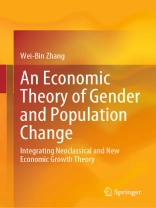This book proposes an economic theory of gender and population change by integrating neoclassical and new economic theories. Modern economies are characterized by complicated dynamic interdependence between many variables such as population growth, human capital accumulation, wealth accumulation, gender division of labor, children caring, environmental changes, various types of conflicts, wars, and so on. However modern dynamic economic theories deal with simplified interdependence between a few variables. Any genuine modeling of economic dynamics result in high-dimensional nonlinear dynamics. Nevertheless, it is only in recent years that it is possible to examine the behavior of highly dimensional dynamics. This partly explains why economic theory has been dominated by modeling dynamic economic systems with a few variables with linear (linearized) relations. Since Malthus published his An Essay on the Principle of Population in 1798, economists have made great efforts to reveal the dynamic complexity of population change. Modern economies have experienced unprecedented population dynamics. No one in human history could even have rationally predicted the natural declination of the national population in modern times. These failures in predicting family structural changes and life expectancy lead to many socioeconomic problems, such as health costs in association with aging and pension systems, that many societies fail to be prepared for. This book contributes to the literature on macroeconomics based on microeconomics, neoclassical growth theory, new growth theory, and family economics by integrating some important ideas in neoclassical growth theory and family economics. This book extensively applies the ideas in the literature to deal with the complexity of population change.
Table of Content
Preface and Acknowledgements.- About the Author.- Chapter 1 Dynamics of Interregional and International Economies.- Chapter 2 Growth, Population, Birth, Mortality, and Gender Time Distribution.- Chapter 3 Wealth, Heterogeneous Households and Gender Division of Labor.- Chapter 4 Growth and Population with Wealth and Human Capital.- Chapter 5 Gender-Based Growth and Population in a Small-Open Growth Model.- Chapter 6 Population, Wealth, and Renewable Resources.- Chapter 7 National and Global Economic Growth and Population Change.- Chapter 8 Economic Development, Population Dynamics, Environmental Change.- Chapter 9 Growth, Preference Change, and Population Dynamics.- Chapter 10 The H-O Growth Model with Economic Structure and Gender.- Chapter 11 Gender Discrimination and Population Change.- Chapter 12 Global Economic Development with National Population Changes and Education.- Chapter 13 Monopsony and Discrimination in the Solow-Stiglitz Growth Model.- Chapter 14 Creativity, Research, and Growth by Integrating Solow, Dixit-Stiglitz, and Romer.- Chapter 15 Gender Power and Family Decision in an Growth Model.- Chapter 16 Further Issues.- References.- Index.
About the author
Zhang Wei-Bin, Ph.D. (Umeå, Sweden), is Professor at Ritsumeikan Asia Pacific University since 2000. He graduated in 1982 from the Department of Geography, Beijing University. He obtained his master’s degree and completed his Ph.D. course at the Department of Civil Engineering, Kyoto University by September 1987. He completed his dissertation on economic growth theory in Sweden, by April 1989. Since then, he had been a researcher at the Swedish Institute for Futures Studies in Stockholm for 10 years. His main research fields are complexity theory in economics (nonlinear economic dynamics, chaos theory, synergetic economics) and sociology, ethics (especially trust and justice), ancient Chinese thought, theory of leadership (focused on Han Feizi and Confucius), American civilization, and the economic development and modernization of Chinese societies (mainland China, Taiwan, Hong Kong, and Singapore), and Japan. He is the sole author of 410 academic articles (200 in international peer-reviewed journals) and 32 academic books in English by well-known international academic publishing houses available on Amazon’. He published two books of poetry (in Chinese) by a well-known publisher in the field. He is an editorial board member of 12 peer-review international journals. He was ranked 4 Top in World among 69211 registered authors in economics in NJP by Sep 2024 (the address below). Prof. Zhang is the editor of the Encyclopedia of Mathematical Models in Economics (in two volumes) which is a part of the unprecedented global effort, The Encyclopedias of Life Support Systems, organized by UNESCO.












